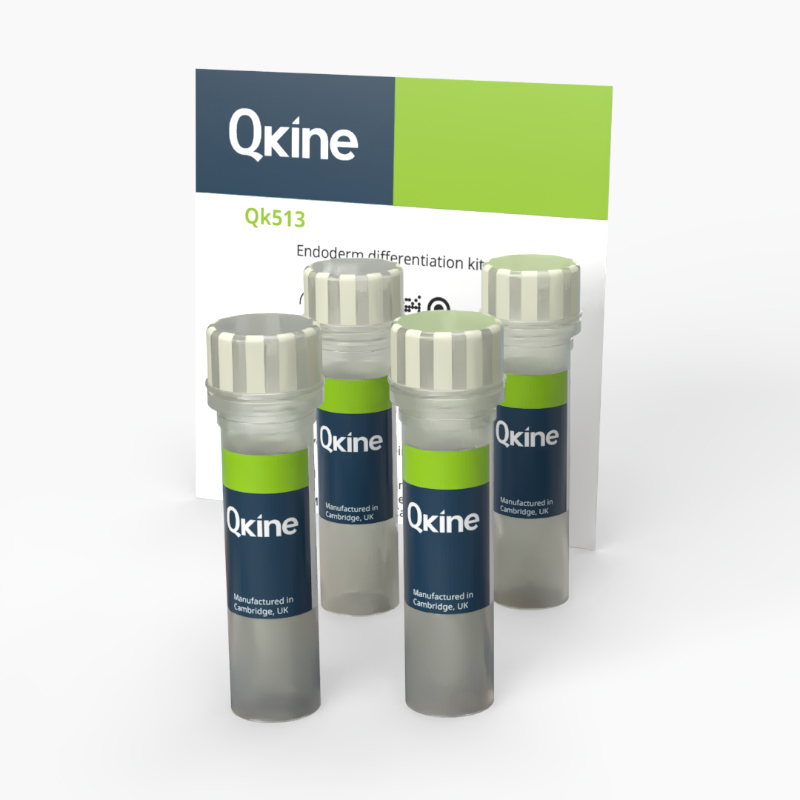 Endoderm differentiation kit (Qk513)
Endoderm differentiation kit (Qk513)Endoderm differentiation kit (Qk513)
Original price was: £660.00.£405.00Current price is: £405.00.
For validating the ability of new or established induced pluripotent stem cell (iPSC) lines to differentiate into the endoderm lineage.
The endoderm differentiation kit is designed to validate the differentiation potential of both newly derived and established iPSC lines. This kit enables the evaluation of the ability of iPSCs to differentiate into the endoderm linage, one of the three primary germ layers responsible for forming the respiratory and digestive systems, as well as organs such as the liver, pancreas, and intestines.
The kit includes carefully optimized growth factors and extracellular matrix required to efficiently guide iPSCs toward the endoderm lineage. It serves as both an endpoint assay, confirming pluripotency and lineage commitment, and a platform for generating endoderm-derived cells for further downstream applications.
Each kit is sufficient for differentiation of 5x 96 well plates.
In stock
Orders are typically shipped same or next day (except Friday).
Easy world-wide ordering, direct or through our distributors.
Original price was: £660.00.£405.00Current price is: £405.00.
Buy online with secure credit card or purchase order. For any questions, please email orders@qkine.com
Summary:
>98%, by SDS-PAGE quantitative densitometry
Animal origin-free (AOF) and carrier protein-free
Expressed in E. coli
Bioactivity Guaranteed
Manufactured in our Cambridge, UK laboratories
Lyophilized
- See reconstitution instructions for individual kit components
Featured applications:
Differentiation of human pluripotent stem cells towards extra-embryonic endoderm, mesenchymal, neural lineages, and chondrocytes
Differentiation of iPSC into endoderm

Human activin A – Qk001 – 25 µg
Frequently used to maintain pluripotency in induced pluripotent and embryonic stem cell cultures. It is also used in many stem cell differentiation protocols, including endoderm lineage differentiation and further maturation into hepatocyte and pancreatic cells.
Human BMP-4 – Qk038 – 25 µg
A key regulator of embryogenesis and supports the differentiation of embryonic stem cells and induced pluripotent stem cells.
Human FGF2-G3 (154 aa) – Qk053 – 50 µg
A thermostable engineered form of human FGF-2. Human FGF2-G3 154 aa is the 154 aa mature domain of FGF-2. The functional half-life has increased from <10 h (wild-type) to >7 days (FGF2-G3).
Human vitronectin – Qk120 – 500 µg
Provides a defined environment that supports the maintenance of pluripotency and is suitable for feeder-free culture, expansion, differentiation, and reprogramming of stem cells.
Further quality assays
Mass spectrometry: single species with expected mass
Recovery from stock vial: >95%
Endotoxin: <0.005 EU/μg protein (below level of detection)
We are a company founded and run by scientists to provide a service and support innovation in stem cell biology and regenerative medicine. All our products are exceptionally high purity, with complete characterisation and bioactivity analysis on every lot.
Protein background
Human induced pluripotent stem cells (iPSCs) are an in vitro model that represent a pivotal breakthrough in regenerative medicine and cellular biology. iPSCs are generated by reprogramming adult somatic cells to a pluripotent state through the introduction of specific transcription factors. Reprogramming iPSCs grants these cells the ability to differentiate into any cell type of the three germ layers: ectoderm, mesoderm, and endoderm. This provides unparalleled potential for disease modeling, drug discovery, and cell-based therapies, all without the ethical concerns associated with using embryonic stem cells [1].
Differentiating iPSCs into endodermal linage cells is particularly important due to the critical roles endodermal derivatives play in human physiology. The endoderm layer forms essential organs like the liver, pancreas, lungs, and the lining of the gastrointestinal tract [2]. Understanding the differentiation process of iPSCs into endodermal cells offers promise for developing treatments for a variety of conditions, including liver diseases, diabetes, and cystic fibrosis, as well as for generating organoids for research and transplantation purposes.
The differentiation process of iPSCs into endodermal cells typically involves mimicking the stages of embryonic development in vitro. During embryogenesis, endoderm formation is initiated by a series of signaling pathways that include nodal, Wnt, and activin/nodal, which are essential for mesendoderm specification and subsequent DE development [3,4]. To mimic these conditions in a controlled laboratory environment, researchers utilize specific growth factors and small molecules to guide iPSCs through comparable developmental signals.
The successful differentiation of iPSCs into endodermal cells comes with its challenges. Variability within iPSC lines, differentiation efficiencies, and the potential for incomplete or mixed lineage differentiation are significant obstacles that researchers continue to tackle. Evaluating success involves examining the expression of markers such as SRY-box transcription factor 17 (SOX17) and transcription factor GATA4 [5].
Additional resources
Our products are for research use only and not for diagnostic or therapeutic use. Products are not for resale.
For use in manufacturing of cellular or gene therapy products. Not intended for in vivo applications.

Receive an Amazon gift voucher when you leave us a review.
£25, $30 or €30 for reviews with an image and £10, $15 or €15 for reviews without an image
